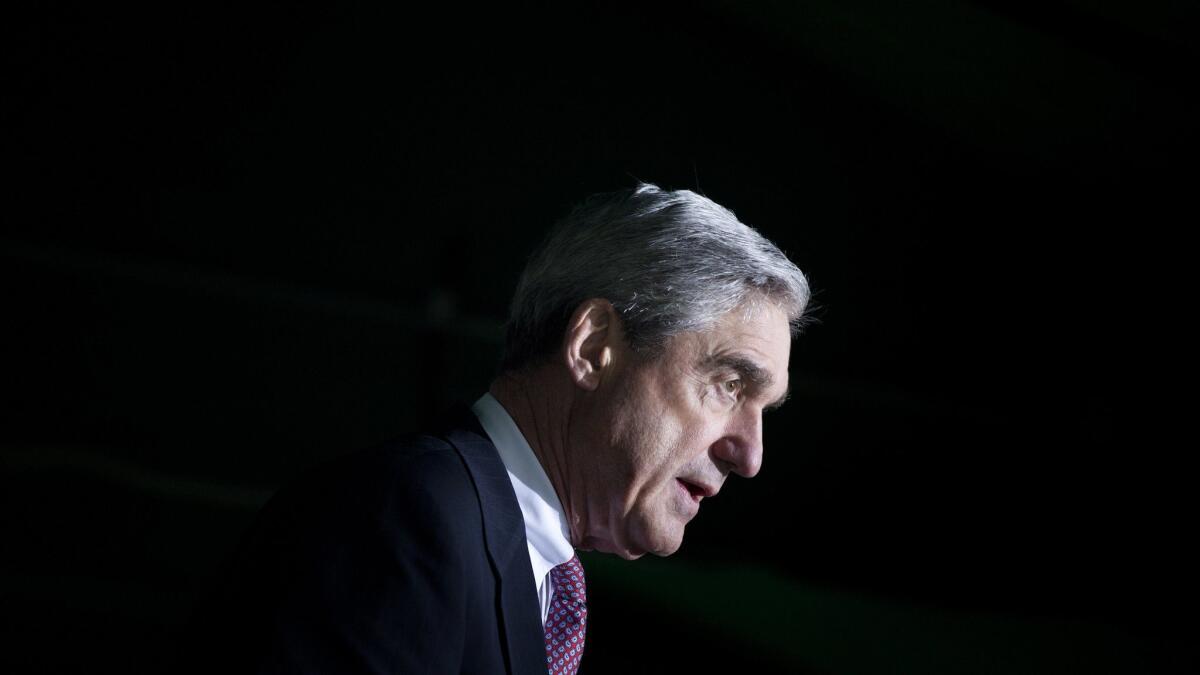Mueller probe files were ‘altered,’ leaked in Russian disinformation effort, prosecutors say

Prosecutors working with special counsel Robert S. Mueller III are claiming that more than 1,000 nonsensitive files turned over to the defense team for an indicted Russian company were leaked by hackers in a cyber-disinformation campaign that appeared to be aimed at discrediting the government’s investigations of “Russian interference in the U.S. political system.”
The prosecutors made the allegation in a federal court filing Wednesday as they asked a U.S. judge to reject a request by lawyers from Concord Management and Consulting to share sensitive evidence outside the United States in trial preparation with Concord’s owner and indicted co-defendant, Russian businessman Yevgeniy Prigozhin.
The filing is another in several pointed exchanges between prosecutors and the defense team from Reed Smith representing Concord.
Prigozhin and Concord were charged last February, along with the Internet Research Agency of St. Petersburg, with conspiring to mount a social media campaign to trick Americans into following and promoting Russian-fed propaganda that pushed voters toward then-candidate Donald Trump and away from Democratic rival Hillary Clinton. Prigozhin is known as “Putin’s chef” because of his catering firm and close ties to the Russian president.
“Certain nonsensitive discovery materials in the defense’s possession appear to have been altered and disseminated as part of a disinformation campaign aimed (apparently) at discrediting ongoing investigations into Russian interference in the U.S. political system,” prosecutors said in their Wednesday filing.
The alleged breach, Mueller wrote, argues against allowing more sensitive evidence to be sent to Russia to be shared with defendants because it “unreasonably risks the national security interests of the United States.”
Concord has pleaded not guilty and is the only Russian entity charged in the Mueller probe to appear in court to mount a defense. Lead Concord attorney Eric Dubelier, of Reed Smith in Washington, declined to comment on the Mueller filing, as did Mueller spokesman Peter Carr.
Lawyers in the case are under a gag order issued by Judge Dabney Friedrich of the U.S. District Court for the District of Columbia.
In the government’s filing, prosecutors said that on Oct. 22 a newly created Twitter account with the handle @HackingRedstone claimed it had penetrated a Russian server and gained access to the “Mueller probe’s database” with information on the Concord case.
“You can view all the files Mueller had about the IRA and Russian collusion. Enjoy the reading!” the court filing states that a tweet read.
The tweet included a link to a file-sharing portal with names, folder structures and tracking numbers matching information turned over by the government, prosecutors said in their filing. Unique identifiers, or “hashtag values,” for more than 1,000 files were found to match those of evidentiary files, which were mixed in randomly with “junk material,” they said.
Mueller’s filing said the online account that published the materials was registered in 2018 by a user with an Internet address in Russia. The account has been suspended.
The prosecutors’ filing said the matching files included images of political memes from Facebook and other social media accounts used online by the Internet Research Agency, many of which are presumably still available elsewhere on the Internet, but not with the unique identifiers used in materials turned over by prosecutors.
Prosecutors said in their filing that an FBI review found no evidence of a hack of the special counsel’s office. The filing also said that defense lawyers told the Mueller team that the vendor it was using reported no unauthorized access to the nonsensitive files. Under a court protective order, sensitive evidence in the case must be reviewed by a U.S. government “firewall” counsel, and then a judge must give permission before the evidence can be given to any non-U.S. national.
The facts “establish that the person(s) who created the Web page had access to at least some of the nonsensitive discovery produced by the government in this case,” wrote Justice Department national security division attorney Heather Alpino for a team including prosecutors with Mueller’s office and the U.S. attorney’s office of the District.
Dubelier has argued that it is critical to Concord’s defense strategy to include Prigozhin, invoking the constitutional right to a fair trial. The U.S. government warned that Concord’s requests could jeopardize the secrecy of a grand jury matter and identify “uncharged individuals and entities that the government believes are continuing to engage” in interference operations like those Concord is charged with undertaking.
Prosecutors said sensitive evidence also could reveal government investigative techniques and identify cooperating individuals and companies.
Friedrich, who said last year she would reconsider the question of sharing evidence with Prigozhin when the case was further along, scheduled a hearing on that issue for March 7.
Friedrich, who was appointed by President Trump in 2017, has rebuked Dubelier for making “meritless” attacks on Mueller, his team, other U.S. prosecutors and federal law enforcement.
Spencer S. Hsu writes for the Washington Post.
More to Read
Get the L.A. Times Politics newsletter
Deeply reported insights into legislation, politics and policy from Sacramento, Washington and beyond. In your inbox three times per week.
You may occasionally receive promotional content from the Los Angeles Times.






